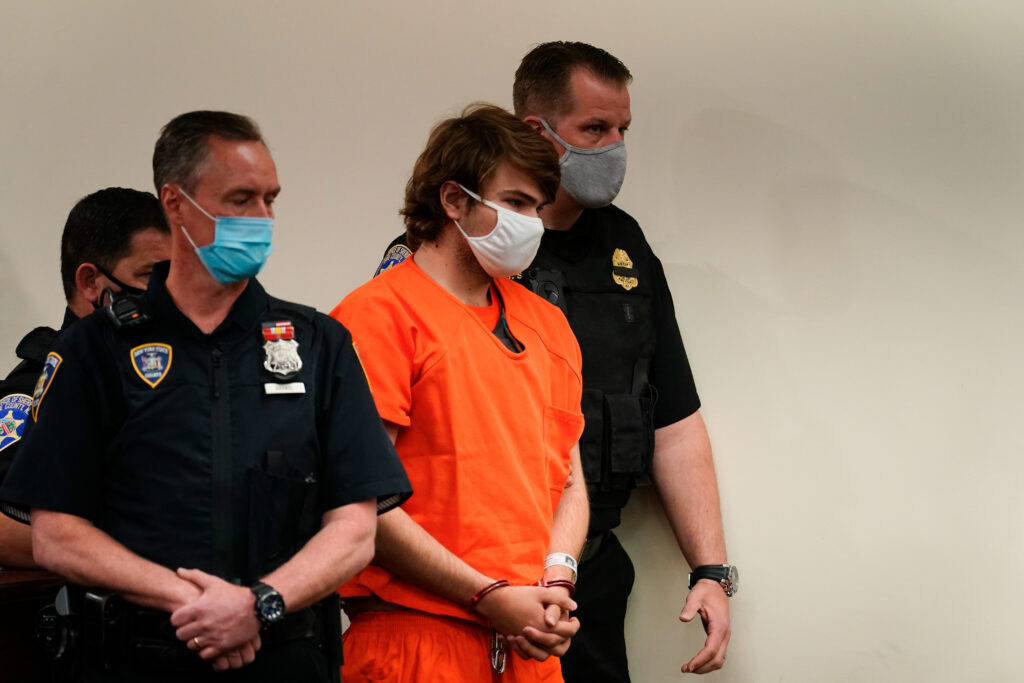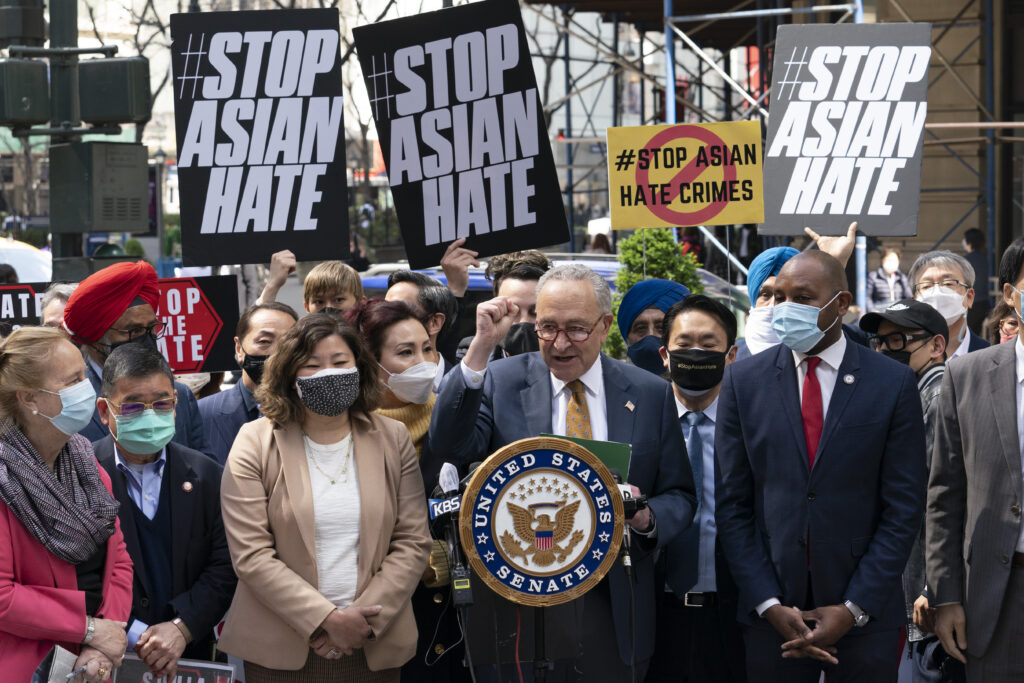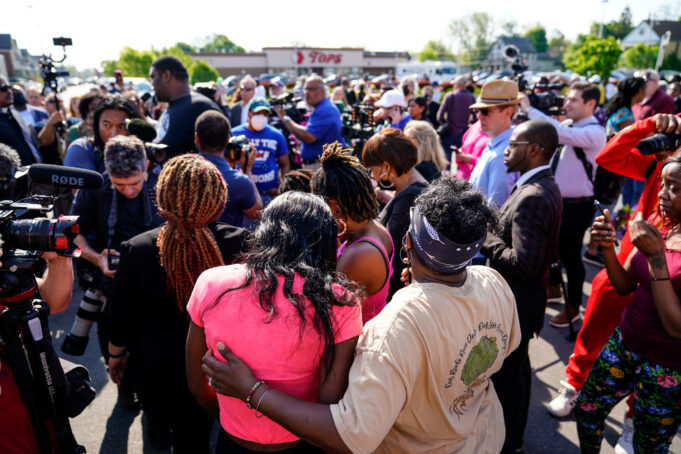In the wake of the mass killing of 10 Black people at a Buffalo supermarket, the U.S. Department of Justice announced new initiatives to address and prevent hate crimes and hate incidents.
The announcement came on the one-year anniversary of the enactment of the Covid-19 Hate Crimes Act. The Justice Department’s “series of actions to deter and confront hate crimes and other bias-related incidents” include issuing guidance aimed at raising awareness of hate crimes during the Covid-19 pandemic; releasing grant solicitations for programs to create state-run hate crime reporting hotlines and to support community-based approaches to prevent and address hate crimes; and hiring the department’s inaugural Language Access Coordinator.
But questions arise on if the new initiatives will make a difference when it comes to Black life, or if they will be more empty promises?
Retired Los Angeles Police Department sergeant and author Cheryl Dorsey believes that “it’s just more of the same.”
“It’s words without real action or consequence. And while I don’t say no to anything, what I’m always waiting to hear is when will there be accountability for the actions of others? When will there be something put into place that will substantively deter the bad behavior? It’s great to have a hotline. It’s wonderful to have a language access coordinator. It sounds real sexy. But what does that do to deter someone from doing what we saw happen in Buffalo? Nothing,” she said to The Final Call.
“It’s not going to give a bad person pause when they go out and buy some sort of assault rifle and be very target-specific in their location of attack because they understand probably that at the end of the day, if they’re caught, not much will be done.”

The guidance issued by the Justice Department includes an overview on the surge of hate crimes and hate incidents against Asian American, Native Hawaiian and Pacific Islander communities. It also includes steps to raise awareness. The department is allocating $5 million in grant funds in support of the National Incident-Based Reporting System, the Office of Victims and the establishment and running of state reporting hotlines for victims of hate crimes. It is releasing another $5 million in grant funds to support community-based organizations and civil rights groups. Ana Paula Noguez Mercado will serve as the department’s first Language Access Coordinator. The latest initiatives were announced May 20.
Hawk Newsome, co-founder of Black Lives Matter Greater New York and the organization Black Opportunities, believes that the initiatives are pacifiers for Black America. He stated that the only way to ensure these promises are fulfilled is to let the Democratic Party know the time for blind loyalty is over
Less than a week after the May 14 shooting in Buffalo, the U.S. House of Representatives passed a resolution condemning the rise of antisemitism due to an alleged antisemitic-associated theory held by Payton Gendron, the 18-year-old killer.
The Justice Department’s report on hate crime awareness and guidance stated that anti-Asian hate crimes increased by over 70 percent over the course of the Covid-19 pandemic. But according to the DOJ’s report, the FBI data revealed that in 2020, bias against Black individuals overwhelmingly comprised the largest category of race-based hate crimes, with a total of 55 percent of race-based hate crimes being motivated by anti-Black bias.
“If you’re talking about anti-Blackness, define it, because when this government gave all those millions of dollars to combat Asian hate, it was called out as Asian hate. The day after the shooting in Buffalo, within days of the shooting in Buffalo our government passed an antisemitism bill. However, when they talk to us, they talk about anti-hate,” Mr. Newsome said.
Ms. Dorsey is in favor of getting rid of elected officials who have just been feeding “at the trough for decades, doing nothing to change our quality-of-life issues.”
“We know that Congress doesn’t really have an appetite to put anything in place that would have prevented what happened in Buffalo, and there will be other incidents probably very similar, I’m sad to say,” she expressed.
Hate within law enforcement
May 25, on the two-year anniversary of the death of George Floyd, President Joe Biden signed an executive order on federal policing. Police reforms have swept the country since Mr. Floyd’s police murder in 2020, yet Black people continue to die disproportionately at the hands of police.
Mr. Newsome included law enforcement in his definition of an anti-Black hate crime.
“An anti-Black hate crime is a hate crime that is based in a disdain for Black people. An anti-Black hate crime is any crime that is race based and the victim is a Black person,” he said. “It amazes me that police officers are not charged with hate crimes, but that is the America that we live in.”
The new federal policing order establishes a national registry of officers who have been fired for misconduct, bans unauthorized chokeholds and places restrictions on no-knock warrants. It also restricts local police departments from transferring and purchasing military equipment, mandates all federal agents to wear activated body cameras and requires law enforcement to intervene and stop the use of excessive force when witnessed.
Senior administration officials have told reporters that awarding of grants might inspire the adoption of the orders on the state and local levels.
“The hope is that it will influence federal guidelines and this executive order will influence state and local decisions,” said Memphis-based Nation of Islam author, researcher and Student Minister Demetric Muhammad to The Final Call. “But at the core of it is the wrongheaded notion that there is a political solution to what the Most Honorable Elijah Muhammad identified as a divine problem.”
He referenced words from the Honorable Minister Louis Farrakhan, the National Representative of the Honorable Elijah Muhammad, who has been warning Black people to make their own communities safe and decent places to live. He stated that if people can’t have an expectation of safety from daily living such as going to a marketplace, then Black people have to come to the conclusion that “we have to police our own neighborhood.”
“We have to take some ownership for where we live. So, an environment is created that causes the sane and the deranged to know and understand that if you come into the Black community, you’re going to be watched. If you come into the Black community, you’re going to be noticed. If you come into the Black community, you’re not going to be able to run roughshod over us with reckless abandon,” explained Student Min. Demetric Muhammad, author of “How To Police The Black Community: Divine Guidance for Law Enforcement From the Most Honorable Elijah Muhammad and the Honorable Minister Louis Farrakhan.”

Ms. Dorsey expressed that while the policing order sounds good, “you cannot compel a police chief to do anything that he doesn’t want to do.” She also explained that officers have always had a duty to report and to intervene when they see police misconduct occurring.
“And that can be anything as simple as someone being disrespectful—that’s police misconduct—up to excessive use of force. That too is police misconduct, and when you don’t stop police misconduct, you as an officer are now yourself committing police misconduct,” she said.
The problem is, “there’s no accountability,” and oftentimes, the officer who reports is retaliated against, she added.
“Officers don’t report misconduct because police chiefs, sheriffs and commissioners haven’t created an environment and an atmosphere conducive to officers reporting misconduct without fear of reprisal and retaliation,” she said.
The problems with policing include the widespread infiltration of White supremacists in law enforcement. An investigation by Reuters found that U.S. police trainers with far-right ties are teaching hundreds of police officers across the country.
Ms. Dorsey could not speak to being trained by White supremacists, but she said, “We do know that White supremacists are within the ranks of these 18,000 police departments.”
She referenced 17 internal gangs that exist within the LAPD. “I don’t know how many of these deputies are White supremacists, but how do you abide by having 17 internal gangs who celebrate harming Black folks, Brown folks and memorialize it by getting tattoos on your body? Having paraphernalia in your office space that represents these various gangs that exist?” she questioned.
She encouraged people to get involved and get engaged by meeting with the people who want to be sheriff, police chief or mayor and asking the tough questions and by “infiltrating” police departments in order to have a say.
Mr. Newsome described law enforcement as the “enforcers of White supremacy.”
“If we envisioned the institution of White supremacy as a building, then law enforcement are the bouncers in the security team. They keep that building safe,” he said.
We know White supremacists have infiltrated law enforcement and have been there for decades, yet despite all of the studies, surveys and findings, nothing has been done about it, he and Ms. Dorsey stated.
“There have been no sweeping reforms. There have been no public investigations. There haven’t even been many indictments. And they allow these race soldiers to run through our streets with a license to kill,” Mr. Newsome said. “And it’s important that people know that in places like New York, which boasts the most diversity in policing than any other police force in the country, that the people at the head of these police departments are White men. And the Black people go out of their way to prove to these White men that their loyalty is to law and order.”
“We can’t trust diversity in policing, because White men call the shots,” he added.
Student Min. Demetric Muhammad quoted the Honorable Minister Louis Farrakhan in saying that you cannot legislate attitudes.
“It doesn’t really matter too much what the laws stipulate because history has proven that those who have in their heart the disease of White supremacy look upon Black people as being inferior, and they find ways within even the toughest of laws to exercise that hatred against us,” he said.
The solutions
In the meantime, Mr. Newsome, said Black people should be patrolling their communities and that there needs to be self-defense and situational awareness training in the Black community.
Ms. Dorsey said it’s possible to create an environment where good officers could report the bad without retaliation, but that it will take time due to the problems being institutional. For her, it starts with replacing police chiefs. She encourages anyone who feels they’ve been a victim of racial profiling, police harassment or retaliation to file a police report to leave a record of officers who misbehave.
“We don’t need any more surveys. We don’t need any more studies. We don’t need anyone to validate the things that we live and experience day to day. We need to get busy being heard. Get involved. Get engaged and be a part of the process,” she said.
Student Min. Demetric Muhammad made an appeal for Black people to revisit the guidance given by Master Fard Muhammad through his student the Most Honorable Elijah Muhammad and through the Honorable Minister Louis Farrakhan.
“We are not a people who have been devoid of access to divine guidance, guidance meaning to tell you where to go, where not to go, to tell you what to do and what not to do, and divine meaning coming from God,” he said.
He stated that Black people must determine the way forward by one, developing love and respect for one another and two, being willing to “accept some of the responsibility for securing our people and securing our communities.”
“Regardless of what kind of laws come out of Washington, regardless of what kind of laws come out of the state legislature or local laws, that does not absolve us of the responsibility to do what other self-respecting people do, and that is take responsibility for the safety and security of their own. That is the mark of maturity as a people, and that is the mark of wisdom,” he said.
That involves organizing rather than just rallying, he added.
“Are you going to be willing to give of yourself and your resources to organize and to implement whatever plans that your community has agreed on that will be implemented for the safety and the protection of our people?” he questioned. “We now have to grow up and do some things that we haven’t been willing to do before. Otherwise, these kinds of tragedies are going to continue.”













